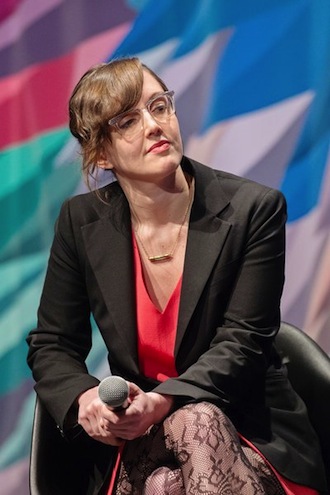Rachael Rakes

Rachael Rakes moderating a discussion with Park Chan-wook on the film "Stoker" at the Museum of Moving Image. (Image courtesy of http://www.monstersandcritics.com)
We’re surprised Rachael Rakes was even able to get back to our email. Between her work as the film editor at the Brooklyn Rail, a programming advisor-at-large for Union Docs, a member of the collectively-run gallery Heliopolis, assistant film curator at the Museum of Moving Image (til recently), and now, marketing manager at Verso Books– she’s got a lot on her plate. Her advice for the youngins? “Prepare for the slog.”
We honor her because she aggressively refuses to fan the hype. Her politics are evident from her past work as publicity manager for the Feminist Press, her new job with the celebrated radical publishing house Verso, and her focus on documentary work, evidenced in her writing for the Rail. She’s also been involved with programs like First Look, MoMI’s annual pre-Sundance film showcase which, in just two years, has already earned a reputation for both rediscoveries and new risk-taking, difficult work. Writing for MUBI, critic Fernando Croci called it “a strong, welcome antidote to the generally anemic cinematic landscape that is January.”
Rakes gives us an antidote to the gallery, too, with recent immersive film and sculpture installations at Heliopolis. We hope to see more of her in these parts.
How do you do everything you do with the Brooklyn Rail, Heliopolis, MoMI, and now, Verso Books, without going nuts?
I seem to do best (measured in terms of crossing things off lists, I suppose) when having a variety of kinds of tasks before me. It’s an attempt at thwarting procrastination. When I don’t want to do one thing at a given moment, there’s usually something else on the list I am willing to do. I also think about work, all the work, all the time. It’s not good, but how it is.
You have a pretty down-to-earth sensibility with people you cover, often turning our attention to people who deserve more attention, or who tend to take on more difficult subject matter. Are you responding to anything you’d like to see change in the art or film worlds?
As far as what we cover with the Rail, there’s definitely the impulse to engage with work that is not well-covered elsewhere. Those often happen to be what we are interested in anyway, as film goers and art viewers. With something as small as the Rail, it seems ridiculous to attempt to participate in the mega-commercial discourse of cultural criticism. The scales align better when we’re covering equally homegrown film and art endeavors. Then again, we include something mainstreamish now and then. We have a review of “Spring Breakers” in the upcoming issue, though I’m sort of in love with that movie.
Has your focus changed at all since you started curating and writing?
I’ve long been drawn to experimental non-fiction moving image work, but of late I’ve become increasingly interested in post-cinema cinema. That is, moving image work that does amazing things outside of the theatrical context, or even a box/cube context–things along the line of the Leviathan/Last Judgement installation at the Berlinale. [Leviathan is a documentary on deep sea fishing, which filmmakers Lucien Castaing-Taylor and Véréna Paravel turned into an installation in the Berlinale]. We recently had a show at Heliopolis [“Structures of Feelings“] with the painter Sandra Sitron and film/video maker Ted Kennedy…I can’t quite tell whether this was “successful” but it’s the kind of thing I want to go further in exploring.
Can you think of an artwork or art worker whom you think people should know more about?
I’m really excited by the fervent, steady stream of programming at Microscope gallery in Bushwick. They combine installations and events very nicely in that tiny space, doing a ton with a little. Their curating combines great classic NY avant-garde with new forms of experimentation in projection, music, and sound.
As far as artists go, I recently moderated a panel on Documentary film and video in gallery spaces with Neil Goldberg as one of the panelists. His work is funny, strange, and observational, and he’s found a way to make the most of exhibiting moving image art thrive in open space.
Do you have any advice for people starting their own spaces?
All the work and pressure is likely to feel stimulating at first but slowly begin to feel more and more like a chore– the novelty wears off. I’d recommend really imagining what you’re in for. If you want to do all the business of getting sponsors, raising money, and putting yourselves on the gallery/alternative space map, plan for the slog. Maybe this seems obvious, but it’s hard to overstate.


Comments on this entry are closed.